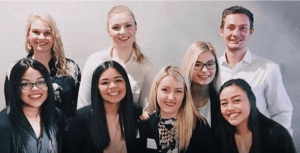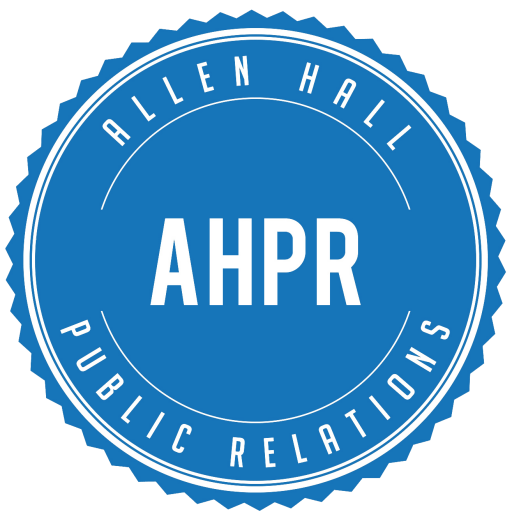Written by Account Executives Haley Dowell, Nikki Kesaris, Katie Thomson and Kristin Peixotto, and Account Supervisor Jenna Perlmutter, Susan G. Komen Account Team.
Maybe you’re hoping to land your “dream” job but you want to learn more about the industry or company before taking the leap and applying. Informational interviews can be awkward and uncomfortable, but they are crucial to learning more about the industry or company you’re applying for and gaining more contacts in the field. Before you begin the informational interview process, it’s important to do your homework.
Start by asking yourself: What are you passionate about and what do you want to learn more about? Utilize your resources, including Google, LinkedIn, Twitter and your friends and family, to find companies that align with your interests. Once you find a contact person, reach out via email or LinkedIn introducing yourself and then mention, for example, “I will be in the area next week and would love to discuss with you what it’s like to work as a ____ at _____.” Remind them that it is at their convenience and you’re happy to accommodate their busy schedule. Most importantly, make sure your email doesn’t portray that you’re asking for a job, but rather seeking information to learn about a company that aligns with your interests.
Once you’ve determined an agreed upon time to meet, we suggest the following tips:
- Do: Be professional
Lose the leggings and messy bun and find that pantsuit in the back of your closet you’ve been waiting to wear. Although you are not actively seeking a job during this informational interview, it is important to leave a lasting impression. This person could potentially become a referral in the future so do your best to dress and act professional.
- Do: Research and come prepared
In the case of any kind of interview, you should always spend some time researching the company. Understand the scope of their clients and the work that they do. Having a basic understanding of the company will make it easier to formulate compelling questions for your interviewee. When putting together your questions, make sure you start out with some basics to ease into the more abstract ones. Be confident in yourself, your research and your questions and you will impress your interviewee with all the extra effort you put into it!
- Do: Respect their time
Like yours, your interviewee’s time is valuable. In your email requesting the interview, include something like, “I would greatly appreciate 20 minutes of your time to…” that way he or she knows how much time to allot. Stay in the allotted time frame by keeping an eye on the clock and closing the interview with something along the lines of “We only have a few minutes left and I don’t want to take up too much of your time…” That way, he or she knows to give you their last few remarks and ideas, or choose to extend the interview a little while longer. Ending an interview can potentially be awkward, but with the right mechanisms, you can keep complete control of it. The interviewee will also be very impressed with your respect to their time.
- Do: Write a thank you note
Remember this person took time out of their day to meet with you. Before the day is over, send a thank you email to the person you spoke with. Mention some points you discussed and learned in your interview, ask about connecting with him or her on LinkedIn and if it went well, even consider asking to meet up again next time you have the opportunity. Show that person you are grateful for their time, and the information they provided you with will help escalate your career. You never know what kind of opportunity this person could present you with one day.
Now that you know what to expect going into an informational interview, here is what to avoid at all costs:
- DON’T: Ask for a job
An informational interview is a way to gather details about a job, profession or
company. This is a networking opportunity, not a job interview. This interview is your
chance to demonstrate your interest in this particular company and build a solid
connection that could benefit you in the future. Asking for a job can make the interview
uncomfortable and leave the interviewer with a bad impression.
- DON’T: Go over the allotted time
Time is a valuable asset, so respect that your interviewer is taking time out of his or
her day to talk with you. To attain all the information you need and make a lasting
impression, use your time wisely. Ask productive questions, make meaningful
comments, and when time is up, bring the meeting to a close. Even if the interview is
going well and you think you can get away with just five more minutes, don’t. Simply
acknowledge that you have used up the allotted time for the meeting, thank them for
their time and if you have more questions, include them in a follow up email.
- DON’T: Rely on the interviewer
An informational interview is for YOU, not the person who already works for the organization. Come prepared with questions that will make the meeting productive and memorable. It is your responsibility to keep the meeting moving in the right direction and ask the questions you want answered. Relying on the interviewer to talk the majority of the time will make the meeting uncomfortable, uninteresting and unproductive.
This past weekend, some of our team members put these skills to the test and engaged with professionals at the Portland Paddle experience.

Recently, I got to flex my informational interview knowledge at the Portland Paddle networking event. The lunch speaker Colby Reade gave some great advice on the subject, which reflects some of our tips listed above! Reade recommended students reach out to parents, friends and professors asking if they could connect you with a person in the field you’re interested in working with. When you find a person to connect with, make sure to dress up like you are going to a job interview because this is the first impression someone will have of you. Also, be sure to brainstorm questions ahead of time. One question he recommended to keep in mind is: “Hypothetically, what skills would you recommend that I add to my resume in order to work at your company?” And when you are concluding the informational interview ask: “Who else should I be speaking to?”
What makes informational interviews and networking events such as the Portland Paddle useful is coming prepared and ready to learn. I was able to initiate conversations with professionals because I did my research. The night before, I looked up information about the professionals I was meeting, including their education, work history and job descriptions. This allowed me to decide what I wanted to ask and the direction I wanted the conversation to go. I was able to discover some of the professionals were UO alum or worked at a company I may want to apply for in the future. Without preparation, it can be difficult to have a successful and meaningful conversation. Overall, the informational interview was extremely helpful because I prepared in advance and was eager to learn!

